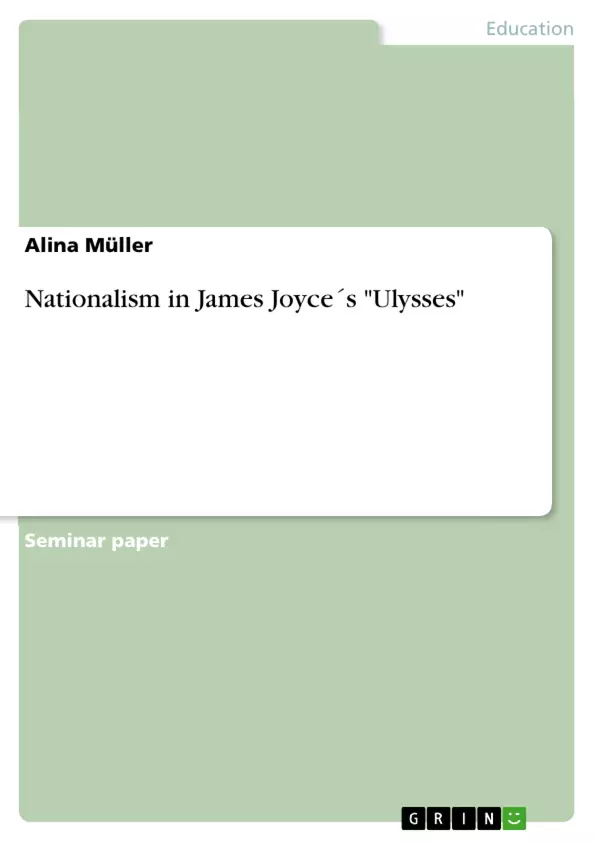The beginning of the twentieth century was accompanied by omnifarious events changing the worldview of people: various teachings, scientific progress, First World War. There is no doubt that all these factors had their impact on literature. The relationship between writer and reader, look inside oneself, own consciousness was reflected on writers such as James Joyce. Irish author, worried about British-Irish conflict and engaged in nationalist question, made the Ulysses novel partially nationalistic in its intention. There is no doubt that in Ulysses, Joyce criticizes the utopian and cultural past of Ireland and ridicules any signs of English chauvinism and Anti- Semitism. At the same time, the author shows his hostility towards the Irish cultural nationalism, and the Catholic and Protestant ideologies. He also revises the concept of “Nation” which has been officially approved at the beginning of nineteenth century. The question remains which themes associated with nationalism does Joyce introduce in the novel. How does he present the characters and relationships between them? These topics are important to observe in order to reveal Joyce´s perception of the history. Further, how does he try to influence the reader by using methods referring to narrative composition, such as extraordinary style and language, allusions, literary devices, narrative structure? What is the author´s intention and meaning underlying the narrative composition? These subjects are necessary to observe to reveal how Joyce shows his struggle against nationalism.
The “Telemachus” and “Nestor” chapters are worth considering, because they most significantly present cultural and historical memories of the author; whereas the “Aeolus” and “Cyclops” chapters considerably deal with nationalistic critique. A more precise understanding of these topics will be introduced in the following pages.
Inhaltsverzeichnis (Table of Contents)
- Introduction
- Nationalism linked to Irish Historical Past
- Stephen-Subject to Exploitation by Colonizer
- Irish-Jewish Parallel
- Nationalism associated with Religious Conflict
- Religion and Joyce
- Stephen- Subject to the "Holy Roman Church"
- Concept of Nation in Joyce's Perception: “Cyclops”
- Nation and Joyce
- Bloom and the Citizen
- Narrative Composition-Decoding Meaning: “Cyclops”
- Conclusion
Zielsetzung und Themenschwerpunkte (Objectives and Key Themes)
The main objective of this work is to analyze the representation of nationalism in James Joyce's Ulysses. It aims to explore how Joyce uses the novel to critique both English imperialism and Irish nationalism. This analysis will delve into the portrayal of characters, the relationships between them, and the narrative techniques employed to convey Joyce's perspective.
- The historical context of Irish nationalism and its connection to the British-Irish conflict
- Joyce's critique of English chauvinism and Irish cultural nationalism
- The role of religion in shaping Irish nationalism
- Joyce's redefinition of the concept of "nation" in Ulysses
- The narrative techniques employed to convey Joyce's views on nationalism
Zusammenfassung der Kapitel (Chapter Summaries)
The introductory chapter provides an overview of the historical and literary context of Joyce's Ulysses, emphasizing the impact of nationalism on the early 20th century. It highlights Joyce's intention to critique both Irish and English nationalistic ideologies in the novel.
The second chapter focuses on the historical background of Irish nationalism, exploring the long-standing conflict between Ireland and England. It examines the colonial conditions under which the Irish people lived, drawing on Joyce's own writings to illustrate the impact of political oppression, ideological and religious controversies.
The third chapter further explores the relationship between nationalism and religion in the novel. It investigates the portrayal of Stephen Dedalus as a character subject to both British colonial control and the influence of the Catholic Church. The chapter delves into Joyce's critique of both English and Irish religious ideologies.
The fourth chapter examines the concept of "nation" as presented in Joyce's Ulysses, particularly in the chapter "Cyclops." It analyzes the portrayal of both Stephen and Leopold Bloom, focusing on the social and political realities of Irish society at the time.
Schlüsselwörter (Keywords)
The primary keywords and focus topics in this work include Irish nationalism, British colonialism, English chauvinism, Irish cultural nationalism, religious conflict, and the redefinition of the concept of "nation." It also explores narrative composition and the use of literary devices in conveying Joyce's perspective on these themes.
- Quote paper
- Alina Müller (Author), 2011, Nationalism in James Joyce´s "Ulysses", Munich, GRIN Verlag, https://www.grin.com/document/182421



